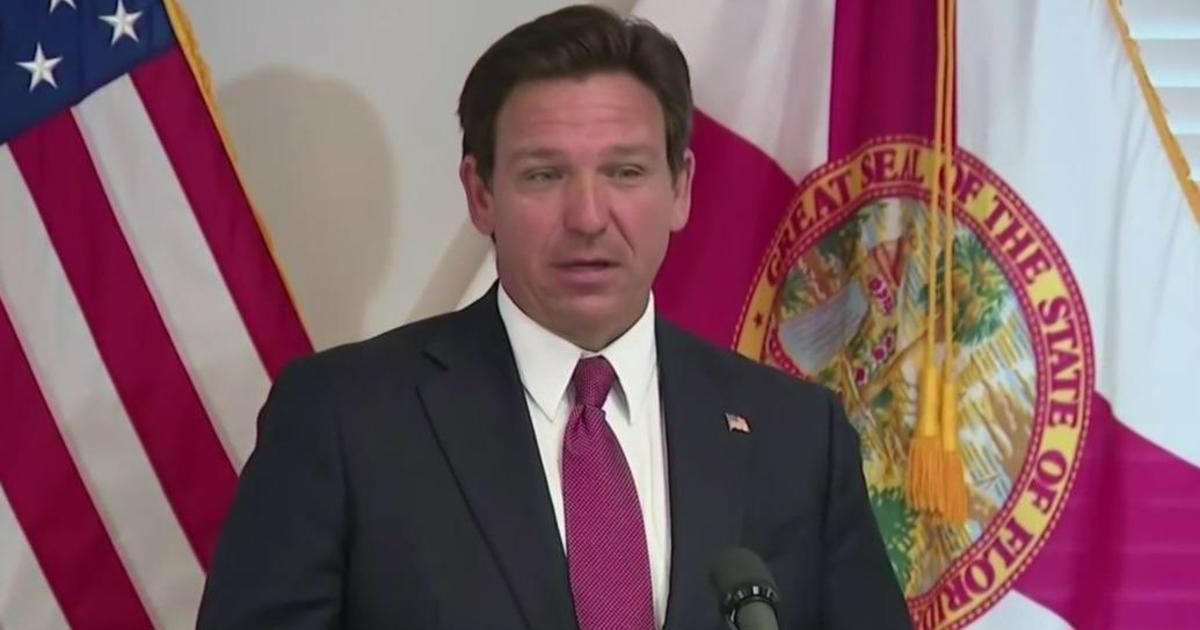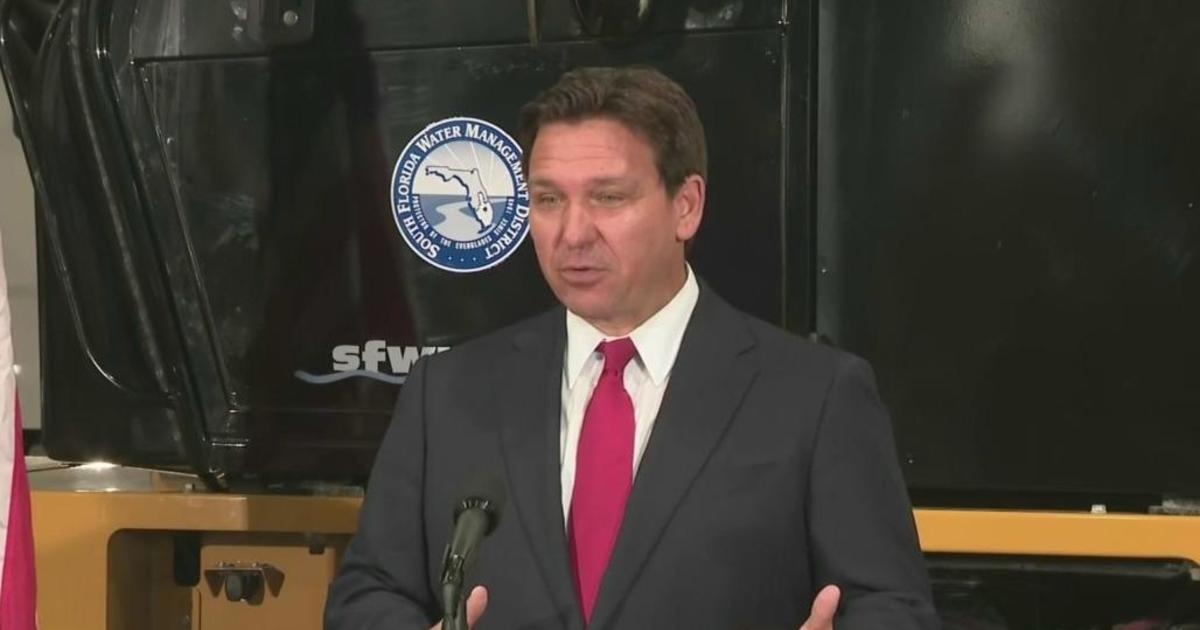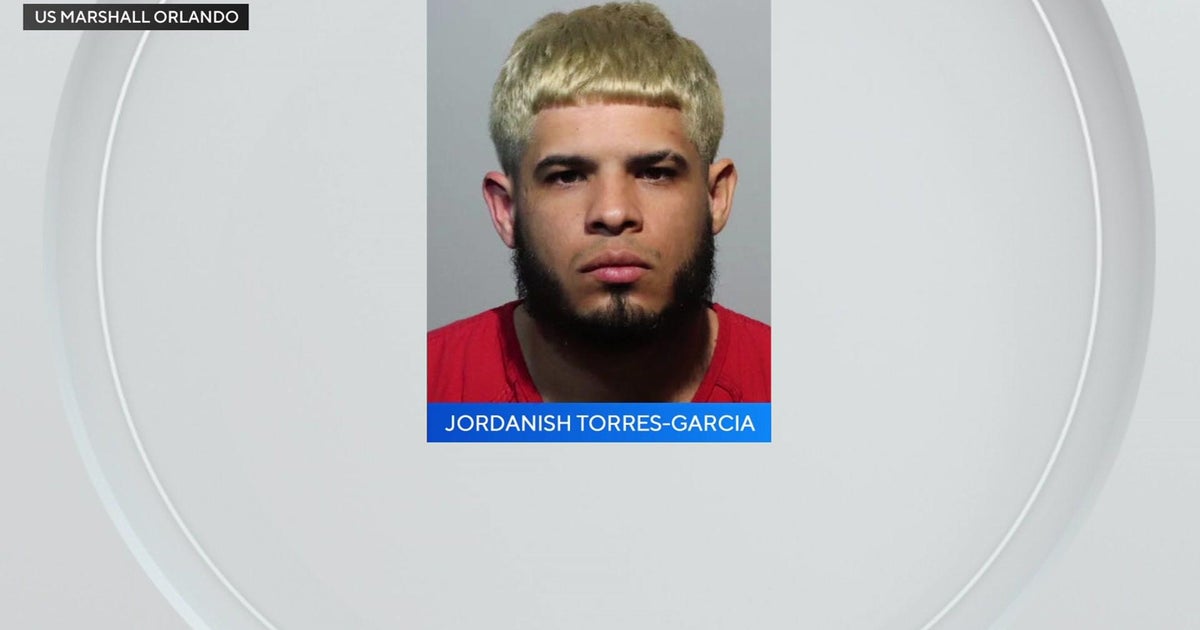Several States, Conservative Groups Back Gov. DeSantis In Florida Felons' Voting Fight
TALLAHASSEE (CBSMiami/NSF) - The legal wrangling over a 2019 Florida law about restoring voting rights to felons continues to draw national attention, as 10 states and two conservative groups have filed briefs backing Florida Gov. Ron DeSantis.
The states and the election-centered organizations support DeSantis' request that a federal appeals court revisit a three-judge panel's ruling that felons who cannot afford to pay court-ordered fines and fees be allowed to vote.
"The panel's holding calls into question the constitutionality of re-enfranchisement statutes in a majority of states, reaching any statute that provides a benefit to felons who can immediately satisfy financial terms of their sentences while requiring less pecunious felons to wait … longer," lawyers for Alabama, Arizona, Arkansas, Georgia, Kentucky, Louisiana, Nebraska, South Carolina, Texas, and Utah, wrote in an "amicus," or friend-of-the-court, brief, filed Wednesday.
The states "have a substantial interest in ensuring that they can continue to pursue the goal of re-enfranchisement alongside other important state interests like deterrence, retribution, and restitution."
DeSantis has asked the 11th U.S. District Court of Appeals for a full-court, or "en banc," review of a Feb. 19 decision by a three-judge panel of the Atlanta-based court.
The panel upheld an October ruling by U.S. District Judge Robert Hinkle, who decided that Florida cannot deny the right to vote to felons who are "genuinely unable to pay" legal fines and fees.
Floridians in 2018 passed a constitutional amendment designed to restores the voting rights of felons who "complete all terms of their sentence including parole or probation."
The amendment excludes felons convicted of murder or sexual offenses.
The legal wrangling centers on a requirement that "legal financial obligations" --- including fines, fees, and restitution --- be paid for felons to be eligible to vote.
That requirement was included in a law approved last year by the Republican-dominated Legislature and signed by DeSantis.
Voting-rights groups quickly challenged the 2019 statute, arguing that hinging voting rights on felons' finances amount to a modern-day "poll tax."
Upholding Hinkle's ruling, the three-judge panel last month found the Florida law "unconstitutionally punishes a class of felons based only on their wealth."
But in Wednesday's brief siding with DeSantis, the 10 states argued that the judges' ruling forces them into an "all-or-nothing choice."
All but two states in the country have imposed voting restrictions "on at least some felons," the brief said.
While all states have some system for allowing felons to regain the right to vote "a majority of those systems take into account whether the felon has completed all terms of his sentence, both carceral and financial," the lawyers added.
The panel's decision would force states to develop new systems to determine whether felons were genuinely unable to pay their financial obligations, the states argued.
Determinations that didn't favor felons "would likely spawn additional litigation," they wrote.
"If states are limited in their ability to pursue re-enfranchisement alongside their other interests, some states may well throw in the towel and prohibit any felon from regaining the right to vote," the brief argued.
Florida, however, would not be able to permanently ban all felons from voting, due to the constitutional amendment.
Echoing arguments made by DeSantis' attorneys, the states argued that the panel ruling was the first time a court had decided that felons who cannot afford to pay legal financial obligations must be allowed to vote.
Eight states, including Alabama and Florida, "explicitly require payment of financial terms of a sentence before a felon can take advantage of at least one avenue for re-enfranchisement," lawyers wrote in the brief filed by Alabama and joined by the other states.
Alabama's law denies voting rights to felons convicted of "crimes of moral turpitude," which includes non-violent crimes such as theft.
Felons can petition to have their rights restored after they pay court-ordered fees, fines, and restitution. The law is being challenged in court.
According to the brief, nine other states, including Georgia, "use broad language, such as requiring the undefined 'completion of the sentence,'" to determine voter eligibility.
The three-judge panel's ruling would reach further because at least 13 states require completion of probation and parole, which often require payment of restitution before voting rights are restored, the states' lawyers wrote.
But Nancy Abudu, a lawyer with the Southern Poverty Law Center, told The News Service of Florida that the plaintiffs in the Florida case have "been emphasizing that they're two separate things, the financial obligations and the fundamental right to vote."
"And one should not be conditioned on the other," said Abudu, one of the attorneys representing the plaintiffs in the lawsuit.
The 10 states maintained in the brief that determining felons' genuine inability to pay "would be a difficult task."
That also has been an issue in Florida, which lacks a single centralized database where felons can find out if they have outstanding financial obligations.
Local databases maintained by county clerks have "inconsistent, incomplete and inaccurate" information, the plaintiffs' lawyers wrote in a brief filed last year.
During a December hearing, Hinkle called the process an "administrative nightmare."
In addition to Alabama and the other states, two national groups --- the Honest Elections Project and the Indianapolis-based Public Interest Legal Foundation --- filed friend-of-the-court briefs on Wednesday.
For example, the Public Interest Legal Foundation urged the full court to review the panel's decision "so that it can perform a balancing test" between the rights of victims and felons.
Hinkle in October issued a preliminary injunction and allowed felons with unpaid financial obligations to register to vote.
But he placed a hold on allowing them to vote. That hold expired Feb. 11, and the three-judge panel this week refused the state's request to keep it in place until the full court takes up the case.
That ruling enables the 17 plaintiffs in the case --- felons who claim to be unable to pay their legal financial obligations --- to cast ballots in the upcoming presidential primary elections.
(©2020 CBS Local Media. All rights reserved. This material may not be published, broadcast, rewritten, or redistributed. The News Service of Florida's Dara Kam contributed to this report.)



